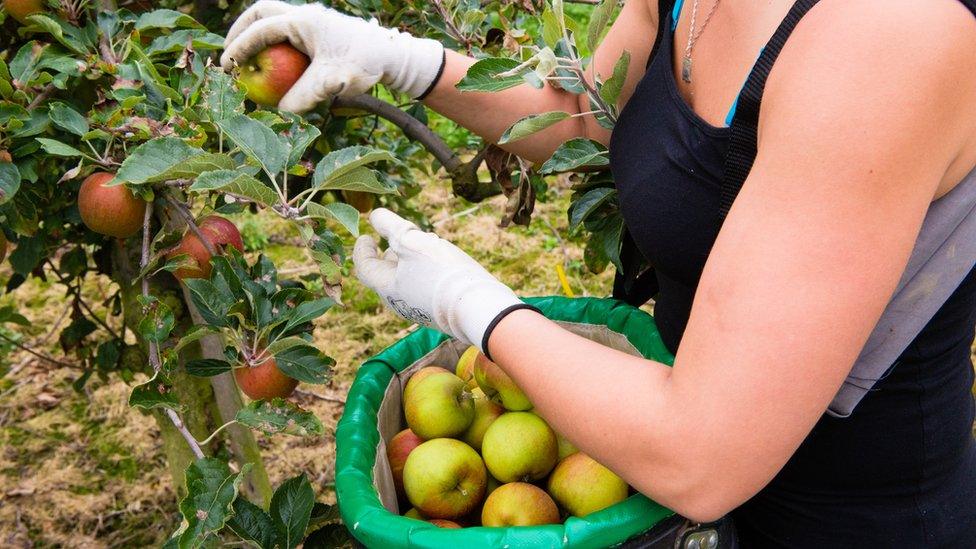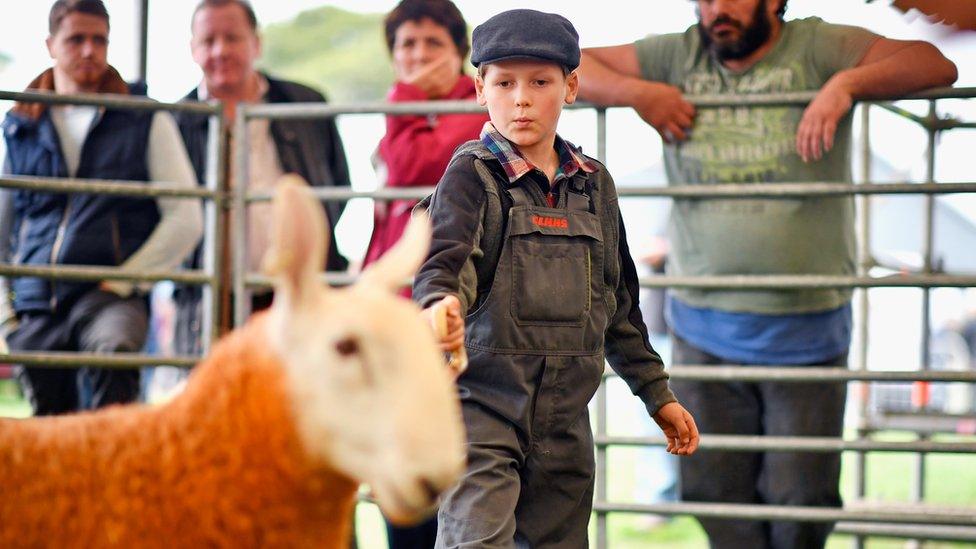Migrant farm workers may stay after Brexit but red tape goes
- Published

Andrea Leadsom says she is committed to helping UK farmers access the labour they need after Brexit
The environment secretary says she is "absolutely committed" to ensuring that British farmers have access to migrant workers after Brexit.
Andrea Leadsom said the government would ensure the food and farming sectors have the labour they need but the details were not settled yet.
Mrs Leadsom also said that leaving the EU will allow the government to slash "ridiculous" farming red tape.
Critics are worried that these plans will damage key wildlife protections.
Worker worries
Around 60,000 seasonal workers come to the UK each summer, mainly from eastern Europe.
Many crop growers depend on these labourers to plant, pick and pack a variety of fruit and vegetables. Mrs Leadsom acknowledged that this was a key issue and was worrying farmers across the UK.
"I've heard this loud and clear around the country, whether in Herefordshire, Sussex, or Northamptonshire, and I want to pay tribute to the many workers from Europe who contribute so much to our farming industry and rural communities," she told the Oxford Farming Conference.
"Access to labour is very much an important part of our current discussions - and we're committed to working with you to make sure you have the right people with the right skills."
Mrs Leadsom said she has spoken "very directly" to the Home Office about the issue and there would be "announcements in due course".

The Environment Secretary says that Britain's farmers will flourish outside the EU
Pressed on the issue, she said "you are asking me to go into the specific policy details which we don't have as yet but rest assured this is being looked at very closely".
Mrs Leadsom also said that dealing with red tape and farm inspections was costing British farmers around 300,000 hours and £5m a year.
Leaving the EU would give Britain the chance to define its own rules and get rid of some of the bureaucracy that farmers find frustrating.
Among the targets would be the so-called three crop rule. This requires around 40,000 UK farmers to grow three different crops on their land each year to qualify for their subsidies.
Supporters say that the imposition boosts conservation and helps fight climate change. Many farmers believe it is unfair as it limits their ability to grow more of the most profitable crop in any given year.
Mrs Leadsom also took aim at other elements of the current regulations that many farmers find irksome.
"No more six foot EU billboards littering the landscape," she said. "No more existential debates to determine what counts as a bush, a hedge, or a tree. And no more, ridiculous, bureaucratic three-crop rule."
The Environment Secretary also indicated that the number of direct inspections of farms would be cut with greater reliance on aerial photography.
Farmers hit by floods would have to fill in far fewer forms she said. UK land managers would "grow more, sell more and export more great British food whilst upholding our high standards for plant and animal health and welfare," Mrs Leadsom said.
2020 vision
While Mrs Leadsom's speech was welcomed by many farmers, critics were worried that the proposed rollback of regulations would damage the environment.
"Our worst fears about a post-Brexit farming landscape are being realised," said Molly Scott Cato, a Green party MEP.
"Rather than using the opportunities offered by Brexit to encourage a move towards a diverse and ecologically sustainable farming system, this government seem determined to dive headlong into encouraging damaging monocultures."
The UK receives around £3bn a year in direct support to farmers and the government have indicated they will guarantee similar support until 2020. There was strong criticism that Mrs Leadsom didn't address the question of what will happen after 2020 in her speech.
"Andrea Leadsom has said nothing about the two most important questions facing UK farmers - whether they will still have access to the single market and what subsidies they can expect to receive post-2020," said Kate Parminter, the Liberal Democrat environment spokeswoman.
"Warm words about wanting to increase British food exports will be meaningless if farmers are faced with a 50% tariff on beef and a 30% tariff on lamb to sell into their biggest export market."
Follow Matt on Twitter, external and on Facebook, external